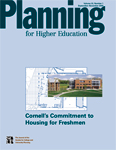- Integrated Planning
Integrated Planning
Integrated planning is a sustainable approach to planning that builds relationships, aligns the organization, and emphasizes preparedness for change.
- Topics
Topics
- Resources
Resources
Featured Formats
Popular Topics
- Events & Programs
Events & Programs
Upcoming Events
- Building Buy-in for Planning: Dealing With Resistance and Gaining Support
Online | March 11 – April 8 - Budgeting for Impact: A Working Group on Resource Planning in Higher Education
Online | Feb 5, Feb 19, March 5 - Cross-Functional Collaboration: Tools and Skills for Working Across Silos
Online | February 10, 17, 24
- Building Buy-in for Planning: Dealing With Resistance and Gaining Support
- Community
Community
The SCUP community opens a whole world of integrated planning resources, connections, and expertise.
- Integrated Planning
Integrated Planning
Integrated planning is a sustainable approach to planning that builds relationships, aligns the organization, and emphasizes preparedness for change.
- Topics
Topics
- Resources
Resources
Featured Formats
Popular Topics
- Events & Programs
Events & Programs
Upcoming Events
- Building Buy-in for Planning: Dealing With Resistance and Gaining Support
Online | March 11 – April 8 - Budgeting for Impact: A Working Group on Resource Planning in Higher Education
Online | Feb 5, Feb 19, March 5 - Cross-Functional Collaboration: Tools and Skills for Working Across Silos
Online | February 10, 17, 24
- Building Buy-in for Planning: Dealing With Resistance and Gaining Support
- Community
Community
The SCUP community opens a whole world of integrated planning resources, connections, and expertise.
 Planning for Higher Education Journal
Planning for Higher Education JournalFinancing Four-Year Public Higher Education in Oregon: Projecting Funding Need and Establishing an Appropriate Student and State Share of Costs
 From Volume 32 Number 1 | September–November 2003By Thomas K. Anderes
From Volume 32 Number 1 | September–November 2003By Thomas K. AnderesThe Oregon University System has developed a resource allocation model intended to equitably distribute state funding based on university mission and enrollments by level of instruction. The methodology is grounded on identifying and achieving the median of peer university funding. A primary feature of the model is that dollars (general fund and tuition and fees) follow the student to his or her enrolling university and are not redistributed to other system programs and universities. The model rewards campuses for meeting or exceeding system and university objectives. Accountability for achieving key indicators and stimulating resident participation is the key ingredient of budget decision making. Ultimately, the peer-based methodology has provided significant latitude to the universities in planning their enrollment and program strategies but within a framework of board, gubernatorial, and legislative anticipation and expectation.
MEMBERS ONLY
Attention Members: Log in to access this item.Not a member? Join now to access this article and all journal articles for free. - Topics
- Topics


